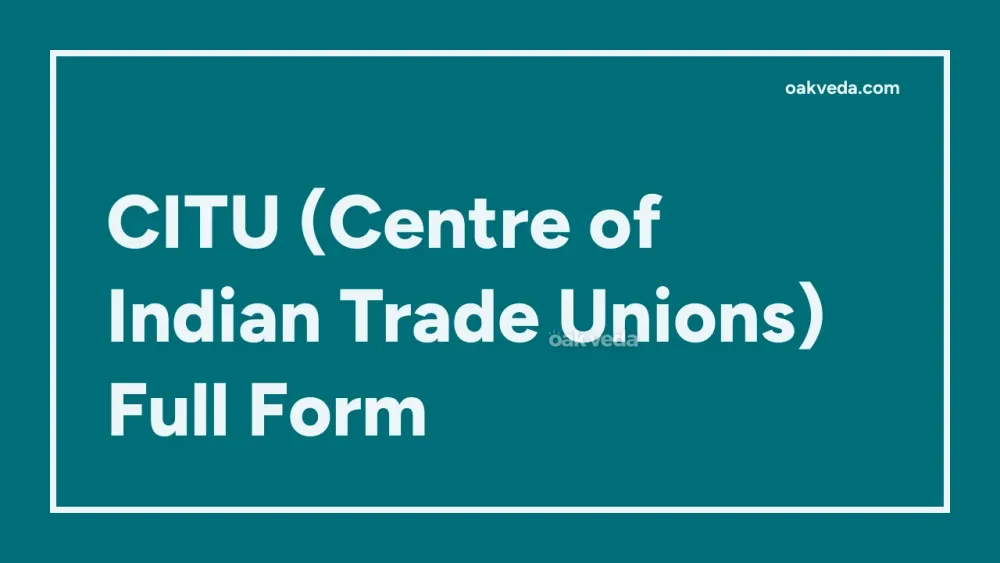
What is the Full Form of CITU?
The full form of CITU is the Centre of Indian Trade Unions. It is one of India's major Central Trade Unions (CTUs) and plays a significant role in representing workers' rights across various sectors of the Indian economy.
What is Centre of Indian Trade Unions?
The Centre of Indian Trade Unions (CITU) is a prominent trade union federation in India. Established with the goal of protecting and advancing workers' rights, CITU has become an influential force in the Indian labor movement. It represents employees across diverse industries, including manufacturing, services, steel, pharmaceuticals, coal, electricity, construction, transportation, and textiles.
Origin and Development of Centre of Indian Trade Unions
CITU was founded on May 30, 1970, as a result of a split within the All India Trade Union Congress (AITUC). The organization emerged with a distinct ideological orientation, aligning itself with communist principles. Since its inception, CITU has grown to become one of the largest trade union federations in India, with a significant presence in several states.
How does Centre of Indian Trade Unions work?
CITU operates on multiple levels to achieve its objectives:
- Grassroots Organization: CITU works at the ground level, organizing workers and forming unions in various industries.
- Collective Bargaining: The organization negotiates with employers on behalf of workers to secure better wages, working conditions, and benefits.
- Policy Advocacy: CITU engages with government bodies to influence labor policies and legislation.
- Political Alignment: As the trade union wing of the communist movement in India, CITU coordinates its activities with like-minded political parties.
- Education and Awareness: The organization conducts programs to educate workers about their rights and current labor issues.
Functions of Centre of Indian Trade Unions
The primary functions of CITU include:
- Protecting workers' rights and interests
- Advocating for fair wages and better working conditions
- Promoting social security measures for workers
- Opposing privatization and neoliberal economic policies
- Organizing strikes and demonstrations to address workers' grievances
- Providing legal assistance to workers in labor disputes
- Conducting research on labor-related issues
Applications of Centre of Indian Trade Unions
CITU's applications extend to various aspects of the labor movement:
- Industrial Relations: CITU plays a crucial role in mediating between workers and management.
- Social Movements: The organization often participates in broader social and political movements.
- Policy Formulation: CITU contributes to the development of labor policies at state and national levels.
- International Solidarity: It maintains connections with international labor organizations to support global workers' rights.
Features of Centre of Indian Trade Unions
Key features of CITU include:
- Ideological Orientation: CITU is aligned with socialist and communist principles.
- Democratic Structure: The organization follows a democratic decision-making process.
- Wide Reach: CITU has a significant presence in states like Tripura, Kerala, and West Bengal.
- Sector Diversity: It represents workers from both organized and unorganized sectors.
- Regular Conferences: CITU holds general sessions every three years to review and formulate policies.
Benefits of Centre of Indian Trade Unions
CITU offers several benefits to workers and the labor movement:
- Collective Strength: By uniting workers, CITU enhances their bargaining power.
- Legal Support: The organization provides legal assistance to workers in disputes.
- Social Security Advocacy: CITU pushes for better social security measures for workers.
- Political Representation: It gives workers a voice in political and policy-making processes.
- Education and Skill Development: CITU organizes training programs for workers' skill enhancement.
Limitations or Challenges of Centre of Indian Trade Unions
Despite its strengths, CITU faces several challenges:
- Political Perception: Its strong political alignment can sometimes lead to skepticism from non-aligned workers.
- Changing Economic Landscape: The shift towards a gig economy and informal work arrangements poses new challenges.
- Globalization Impact: Increased global competition affects CITU's ability to negotiate with multinational corporations.
- Membership Retention: Like many trade unions, CITU faces challenges in attracting and retaining younger members.
Future Developments in Centre of Indian Trade Unions
As the Indian economy evolves, CITU is likely to adapt its strategies:
- Digital Outreach: Increasing use of technology to connect with workers and organize campaigns.
- Focus on Informal Sector: Developing new strategies to organize and represent workers in the growing informal sector.
- Skill Development Initiatives: Expanding programs to help workers adapt to changing job market requirements.
- Environmental Concerns: Integrating environmental issues into labor rights discussions.
- International Collaborations: Strengthening ties with global labor movements to address challenges of multinational corporations.
FAQs on CITU Full Form
-
What is the primary objective of CITU? CITU's main objective is to fight against any interference in the economic and social rights of employees and to improve their rights and liberties.
-
How often does the CITU Conference take place? The CITU General Session, known as the CITU Conference, takes place once every three years.
-
What is the organizational structure of CITU? CITU comprises affiliated unions, a general council, state conferences, state councils, and state committees.
-
In which Indian states does CITU have a strong presence? CITU has a significant presence in Tripura and a strong influence in Kerala and West Bengal.
-
How does CITU differ from other trade unions in India? CITU is distinguished by its socialist orientation and close alignment with communist political ideology.
By understanding the full form and functions of CITU, workers and stakeholders can better appreciate its role in shaping India's labor landscape and advocating for workers' rights across various sectors of the economy.
You may be interested in:

